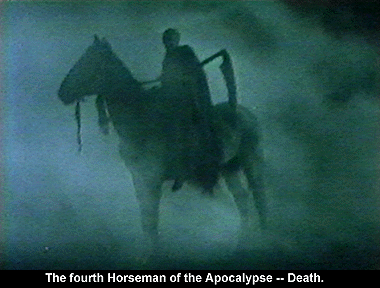 "Yes, I did sign it, but in good faith, believe me. Millions of Frenchmen
have signed it. Someone came around asking if I was against the atomic
bomb no matter who used it, and, well. . .nobody likes the atomic bomb."
"Yes, I did sign it, but in good faith, believe me. Millions of Frenchmen
have signed it. Someone came around asking if I was against the atomic
bomb no matter who used it, and, well. . .nobody likes the atomic bomb."
—Maurice Chevalier on an "immense
injustice" which caused him "more sorrow than pain" when, in 1951, the
US government denied him a visa for signing the Communist-sponsored Stockholm
Peace Appeal calling for the ban of nuclear weapons.
In the 1950s, Paul Robeson was blacklisted
in large part because of his peace activism during the Cold War.
In 1951, he declared:
"There is no doubt in my mind but
that it is possible to find ways of agreement between nations of different
economic and social systems. The people of the world clearly want
this agreement. It rests with us here in the United States to do
our share, to give the final popular push which will let our government
know that the people of this great country, in their vast majority, also
want peace in the world--not destruction. . . .As for me, I see war as
the major evil of our time. It is a monster which solves no problem
but aggravates all. The present conflict and its danger of expansion
have placed the burden of mounting armaments on the backs of the working
masses of our land, have accentuated the obvious and cancerous disparity
between the ill-gained profits of the wealthy few and the meager subsistence
of the multitude of producers. . . .The fight for peace -- resistance against
the exploiters and oppressors of mankind who want war to further their
greedy ends -- the fight for peace is today the center of all these struggles,
of all the aspirations of working people, artists, intellectuals the world
over who form the world movement for peace."
Defying the US government which
had revoked his passport, Robeson gave a concert in 1953 for thousands
of Americans and Canadians near the international boundary or "Peace Arch"
between the two countries. In his speech, he stated:
"I know there is one humanity,
that there is no basic difference of race or color, no basic difference
of culture, but that all human beings can live in friendship and peace.
I know it from experience. I have seen the people. I have learned
their languages. I sing their songs. And I go about America,
or wherever I may go, seeking of simple things. . . .I said long ago that
I was going to give up my life to spend my day-to-day struggle down among
the masses of people, not even as any great artists up on top somewhere--but
right here in this park, in many of the picket lines, wherever I could
be to help the struggle of the people. And I will never apologize
for that."
From an entry
in the wartime diary written by Frank Capra in 1943 after witnessing an
air raid in London:
"The flower of the nations wiping
each other out. What a crime. Surely God didn't mean us to
do all this to each other. . .Why must the noblest elements get destroyed
and not the wicked? The whole thing doesn't make sense. I sincerely
believe the common people will someday declare war on war itself.
Until that happens we will fight each other for power, commerce or material
interests."
"I am not a Communist;
neither have I ever joined any political party or organization in my life.
I am what you call a peace-monger."
—Charlie Chaplin's reply to
the House Un-American Activities Committee's inquiries about his politics.
In 1952, political pressures in the US at the height of the Cold War drove
him into exile in Switzerland.
"Must you forever
kill those who love you?"
—Flo, Jean Diaz' friend, to
a war-frenzied mob who burn the visionary at the stake for summoning the
World War I dead of all nations to denounce the new conflict in J'ACCUSE.
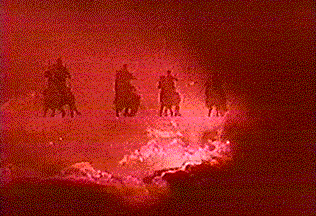 "The first Horseman to lead Prophecy's devastating forces is--Conquest!
The second--War, in all his hideousness! The third, trailing in their
wake--Pestilence, carrying the Scales of Famine! And in relentless
pursuit, the fourth Horseman--Death! The agony of humanity under
the brutal sweep of the Four Horsemen has already begun!"
"The first Horseman to lead Prophecy's devastating forces is--Conquest!
The second--War, in all his hideousness! The third, trailing in their
wake--Pestilence, carrying the Scales of Famine! And in relentless
pursuit, the fourth Horseman--Death! The agony of humanity under
the brutal sweep of the Four Horsemen has already begun!"
—Tchernoff (Nigel
de Brulier) in THE FOUR HORSEMEN OF THE APOCALYPSE.
"The motion picture
is war's greatest antidote."
—D. W. Griffith, The Rise
and Fall of Free Speech in America (1916).
"Apart from the
fact that LA DIVINE TRAGEDIE will be the crowning achievement of my life's
work, my interest in making it derives from the conviction that showing
such a film to the masses would release such a will for peace as would
save humanity from impending cataclysm."
—Abel Gance in 1952 on a projected
epic film on the life of Christ intended as part of a series on the world's
great religions entitled LES GRANDS INITIES. Despite careful
preparations, the director was unable to obtain financing to make LA DIVINE
TRAGEDIE or the other films in the series that he hoped would promote world
peace by appealing to the "hearts and the best instincts" of humanity.
"If moving pictures
properly done of the horrors of war had been inoculated in all the nations
of Europe, there would be no bodies of men lying on European battlefields."
—D. W. Griffith (1915)
"It's been a
long while since we enlisted out of this classroom--so long I thought maybe
the whole world had learned by this time . . . Three years we've had of
it--four years! And every day a year and every night a century."
—Paul Baumer (Lew Ayres) to
the class in ALL QUIET ON THE WESTERN FRONT.
"Cannon shells!
Cannon shells! Instead of bread! Instead of bread!"
—A series of titles preceding
the revolt of the starving populace of Russia during World War I in THE
END OF ST. PETERSBURG.
"We learned that
death is stronger than duty to one's country."
—Paul Baumer (Lew Ayres) to
Kat (Louis Wolheim) in ALL QUIET ON THE WESTERN FRONT.
"Why are we fighting
. . . ?"
—Title in THE END OF ST. PETERSBURG.
"Me, I'm your
comrade. I'm not your enemy."
—A wounded French soldier in
the cot next to Karl as he seizes the hand of the dead German in WESTFRONT
1918.
"And manufacturers--they
get rich."
—A German soldier in a discussion
of the reasons for war in ALL QUIET ON THE WESTERN FRONT.
"Blood, blood,
stinking blood! I can't stand it, I can't stand it! I'm going to stop it,
I'm going to stop it! I'm going to stop the whole rotten mess!"
—Jerry (Fredric March) in THE
EAGLE AND THE HAWK.
"Can't you realize?
This isn't life up here--it's death. War, war! It's gotten
to us."
—Monica (Evelyn Brent) in THE
MAD PARADE.
"Isn't any war--
Isn't
any war--
Isn't
any war--"
—Jack Powell (Charles "Buddy"
Rogers) during a drunken revelry in Paris refusing to accept the fact that
his leave has been cancelled in WINGS.
" To the front!
To the front!
To the front. . . . Front! . . . FRONT!"
—Title in THE BIG PARADE.
"You mean they
want us to go on fighting? . . . They're crazy!"
—Tjaden (Slim Summerville) to
Paul Baumer (Lew Ayres) on Imperial Germany's resolve to continue the war
despite dwindling supplies in ALL QUIET ON THE WESTERN FRONT.
"Cyrus sweeps
on to Babylon's destruction."
—Title referring to the Persian
superpower's final assault on the Iraqi capital in INTOLERANCE.
"My friends,
I return to you, I need you. Listen, your sacrifices were in vain.
The living want to make war again. But I, your spirit and will on
earth, I oppose. This is the hour of our pact. Help me, my
friends, my brothers, my comrades. Your friend is speaking to you,
crying to you. Mankind has taken to war again. I call for help.
You must help me, you must! I call to you!"
—Jean Diaz (Victor Francen)
at the Verdun monument as he calls for the spirits of his 12 million comrades
killed in the First World War to appear to the living and condemn them
for inciting a new war in J'ACCUSE.
"How does it
always end? In misery, suffering and the blood of the people! Our strutting
generals plunged us recklessly into a war for which we were totally unprepared.
Is it any wonder that we were disastrously defeated?"
—Paul Muni in the title role
of THE LIFE OF EMILE ZOLA on the outcome of the Franco-Prussian War.
"It seems sort
of silly, doesn't it? Those smug little ideas we used to have about
loving and living. The war's blown them all to hell along with several
million men."
— Monica (Evelyn Brent) in THE
MAD PARADE.
"What can happen
to us afterwards?"
—Paul Baumer (Lew Ayres) contemplating
the soldiers' bleak postwar future in ALL QUIET ON THE WESTERN FRONT.
"Suddenly the
clamor of war is stilled. . . .the iron grip is broken. . . .the smoke
clears. . . ."
—Title in WINGS.
"Peace has come--but
the Four Horsemen will still ravage humanity -- stirring unrest in the
world--until all hatred is dead and only love reigns in the heart of mankind."
—The concluding title inTHE
FOUR HORSEMEN OF THE APOCALYPSE "spoken"
by Tchernoff at the cemetery where the hero Julio lies with numberless
other war dead.
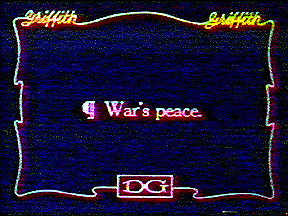
|
"War's peace."
—Title in THE BIRTH OF A NATION
preceding the shots of dead soldiers on
the Civil War battlefield.
|
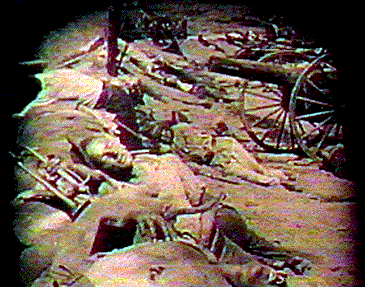
|
†Carole
Lombard
(1908-1942), co-star of THE EAGLE
AND THE
HAWK and
TO BE OR NOT TO BE,
killed in
a plane crash while returning from a US bond tour.
†Phillips
Holmes (1907-1942), co-star of BROKEN
LULLABY
and
MEN
MUST FIGHT, killed in a collision
on a Royal
Canadian Air Force plane during his World War II service.
†Leslie
Howard (1893-1943), co-star of GONE WITH
THE WIND,
killed when his plane was shot down by enemy forces.
|
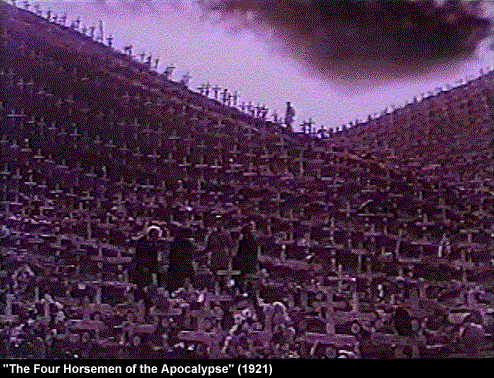
[previous]
page 6
[page 1 | page
2 | page 3 |
page
4 | page 5 |
page 6 ]
|
 "Yes, I did sign it, but in good faith, believe me. Millions of Frenchmen
have signed it. Someone came around asking if I was against the atomic
bomb no matter who used it, and, well. . .nobody likes the atomic bomb."
"Yes, I did sign it, but in good faith, believe me. Millions of Frenchmen
have signed it. Someone came around asking if I was against the atomic
bomb no matter who used it, and, well. . .nobody likes the atomic bomb."
 "The first Horseman to lead Prophecy's devastating forces is--Conquest!
The second--War, in all his hideousness! The third, trailing in their
wake--Pestilence, carrying the Scales of Famine! And in relentless
pursuit, the fourth Horseman--Death! The agony of humanity under
the brutal sweep of the Four Horsemen has already begun!"
"The first Horseman to lead Prophecy's devastating forces is--Conquest!
The second--War, in all his hideousness! The third, trailing in their
wake--Pestilence, carrying the Scales of Famine! And in relentless
pursuit, the fourth Horseman--Death! The agony of humanity under
the brutal sweep of the Four Horsemen has already begun!"


